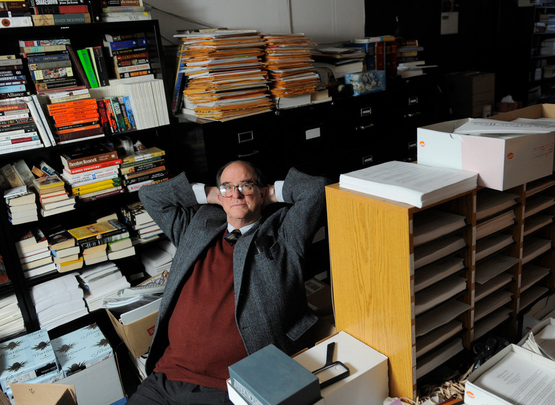OF THE THREE R's, says Will Fitzhugh, the founder and publisher of The Concord Review, the middle R has long been the most neglected. It was true in his own case — when he arrived at Harvard as a freshman 61 years ago, he had never had to write a single term paper — and it remains true now. On the whole, American students graduate from high school incapable of writing a coherent, well-researched essay. Most of those who continue to college don't become competent writers there, either.
For years, blue-ribbon panels and high-powered commissions have bewailed this state of affairs, to little visible effect. The last time the federal government measured writing skills among middle- and high-school students, it found that nearly 3 out of 4 could not pass a test of writing proficiency. Employers are forced to spend enormous sums on remedial writing courses for their workers — by one estimate, as much as $3.1 billion per year.
Fitzhugh, who worked for the Apollo space program, Westinghouse, and the Peace Corps before finding his calling as a teacher, didn't have billions when he launched The Concord Review in 1987. All he had was $80,000 he had inherited from his father, some familiarity with desktop publishing software, and the fervent conviction that what works for high school athletics could work for writing: Promote and praise the top achievers, and other students will be inspired by their example.
 Will Fitzhugh founded The Concord Review in 1987. To date, he has published lengthy history research papers by more than 1,200 authors, all of them high-school students. |
Three decades later, Fitzhugh's journal has become the world's foremost showcase for first-rate history research by secondary-school students. To date, the review has published 1,230 essays by authors from 44 states and 40 other countries, on an astonishing variety of historical topics. These are not short compositions of a few hundred gauzy words. On average, papers published in The Concord Review run 7,000 words, along with detailed endnotes. Among the offerings in the latest issue are a paper on the Opium Wars, written by Stephanie Zhao; an essay on Ronald Reagan and the Cold War by Siddharth Tripathi; and a study of the Treaty of Trianon by Milan Kende Loewer.
Alas, the world's foremost journal for such exemplary writing is still the world's only such journal. And the vast majority of high school students have never heard of it.
That wasn't what Fitzhugh anticipated when he published his first issue.
During his years of classroom teaching at Concord-Carlisle High School in Concord, Mass., Fitzhugh had always had a few students who did more than he asked them to do. Their research was more thorough, their analysis sharper, their writing longer and more careful. They earned good grades, but other students weren't encouraged to notice their work. While the school's best athletes were local heroes, the school's best students earned little acclaim.
Amid all the lamentation about the state of American education — and by the mid-1980s, the lamenting was considerable — Fitzhugh was repeatedly struck by the contrast between athletics and academics. High school athletes were held to very high standards, and those who met them were showered with encouragement. The best high school basketball players, swimmers, or runners were often profiled by the media in "All-Scholastic" special sections; the very best might even be recruited by college coaches, who kept abreast of the most impressive up-and-coming talent.
But there were no newspaper profiles of outstanding high school history students, no outreach from the chairmen of college history departments, no recognition from best-selling historians. No academic journal was interested in publishing the serious writing of high school students. No foundation offered lucrative prizes for top-notch scholarly writing by authors in their teens.
Fitzhugh decided to blaze a path. He quit his job, cashed in his pension, and devoted himself full-time to producing a journal that would show the kind of scholarly writing youthful students were capable of. He adopted "Varsity Academics" as his slogan and put out a call for excellent history essays. The journal's purpose, he says, was to serve as a new kind of peer pressure: to demonstrate to high school students everywhere what kids their age could achieve.
As word of The Concord Review trickled out, the superb history papers began coming in. So did tributes from supporters as varied as Albert Shanker, Arthur Schlesinger, Jr., John Silber, and David McCullough. So did modest financial support from a handful of donors who grasped the potential of what Fitzhugh was doing.

But it has always been a hand-to-mouth existence. Fitzhugh never saw anything like the tens of millions of dollars that are poured into after-the-fact remedial writing instruction and into gimmicky feel-good campaigns by foundations more interested in boosting self-esteem than in challenging students to work hard. Over and over, Fitzhugh's grant applications have been rejected on the grounds that his journal is too elitist, or that it doesn't have a politically-correct edge, or that the study of history isn't, after all, nearly as important as he seems to think it is. A few high schools have embraced The Concord Review, but far more want nothing to do with a journal so committed to high academic standards.
Through it all, Fitzhugh persists, cheerful and determined — and passionate as ever about student achievement. It remains the case that most high school students are never required to write a serious research paper. But now there are 30 years' worth of Concord Reviews that open a window into an alternative universe. You want to see what high school kids can do? Spend some time with The Concord Review, and prepare to be inspired.
(Jeff Jacoby is a columnist for The Boston Globe).
-- ## --
Follow Jeff Jacoby on Twitter.
Discuss his columns on Facebook.
Want to read more? Sign up for "Arguable," Jeff Jacoby's free weekly email newsletter.

